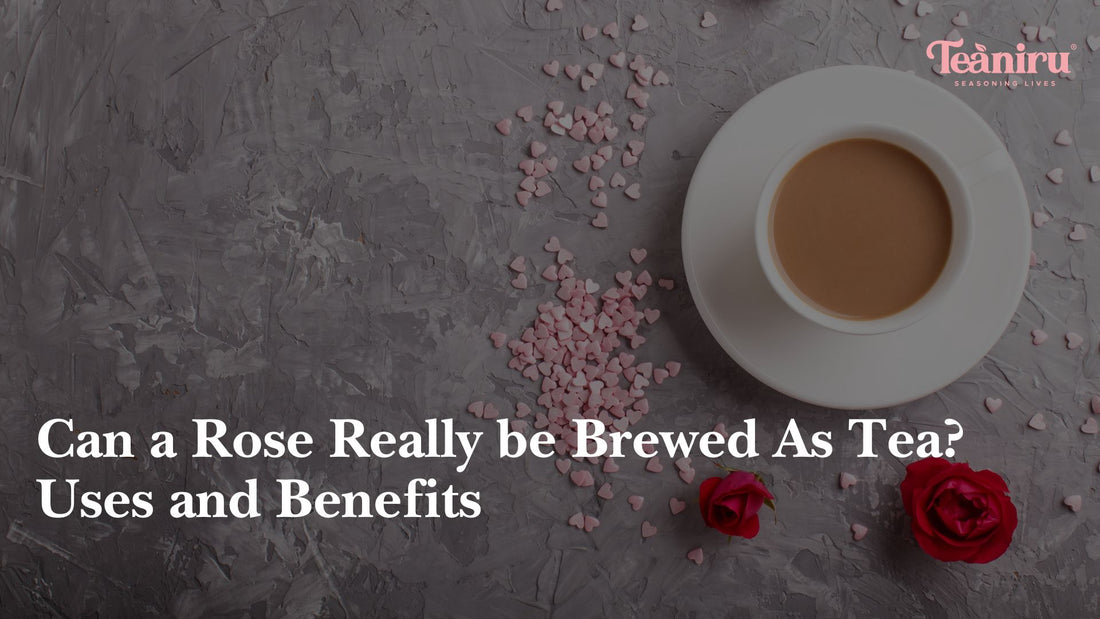Making tea with roses is not something new to Indians, but we can say it is a new trend among this generation. They often use roses only for applying to their faces, which involves unnatural processes or chemicals mixed with rose flavour or additives that don't provide even half of the real benefits that the natural ingredient offers.
People need to understand that achieving glowing and healthy skin, a healthy body, and a sound mind starts with consuming essential nutrients rather than just applying them externally. Let’s understand what are the uses and benefits of the rose by consuming it as tea.
Rose Tea Benefits:
1. Healthy and Young-Looking Skin
Did you know that rose petals possess incredible properties for treating skin conditions? They are packed with antioxidants and antibacterial elements. Surprisingly, drinking rose tea regularly can aid in treating acne. Keeping your skin hydrated is key, and you can try washing your face with rose tea to achieve clear skin.
Rose tea is rich in both vitamin E and vitamin C, which are among the best vitamins for maintaining healthy skin. Vitamin C, a vital antioxidant crucial for the body's healing abilities and defense against infections, is abundant in this tea.
2. Rich in Vitamin C
Rose petal tea is rich in vitamin C, making it an excellent choice to boost your immune system when feeling unwell or combating colds and the flu. Remember, vitamin C is essential for maintaining good health and preventing illnesses.
Additionally, rose petal tea contains flavonoids, which are antioxidants found in plants and can further contribute to enhancing your immune system's defenses.
3. Great for Your Skin and Hair
Besides boosting your immune system, the vitamin C in rose tea stimulates collagen production, a vital protein crucial for maintaining healthy skin and hair. This increased collagen synthesis assists in maintaining skin elasticity, keeping it firm and youthful. Additionally, vitamin C in rose tea contributes to healthy hair.
Moreover, the compounds present in rose tea aid in preventing and minimizing visible signs of aging, such as wrinkles and fine lines on the skin. When applied topically, rose tea can effectively moisturize the skin, leaving it with a radiant glow.
Adding to this, the vitamin C in rose tea plays a pivotal role in collagen formation. Collagen, the structural protein in our body, is responsible for maintaining skin elasticity and strength. Vitamin C supports the body's collagen production process, ensuring healthier and more youthful-looking skin.
4. Good for Heavy Periods
If you're experiencing irregular periods, consider drinking rose tea as it aids in relieving pain and eventually regulating the flow's heaviness. Adding honey and black pepper powder can further help in decongesting the blood flow.
Rose tea is incredibly supportive during menstrual pain and irregular menstruation. Its compounds, like polyphenols and flavonoids, possess anti-inflammatory properties that can ease cramps and discomfort. Additionally, the tea's gentle astringent nature assists in regulating menstrual flow.
5. Good for Bowel Movement
Rose tea possesses detoxifying properties, acting as a natural laxative for constipation. Surprisingly, it can also alleviate diarrhea and is beneficial for individuals with liver ailments.
Rose tea contains compounds like tannins and polyphenols, which contribute to its detoxifying abilities. These compounds aid in promoting digestive health and supporting the liver's function.
6. Supports in Weight management
It's important to note that there isn't a miracle tea that can instantly burn all your calories in a day. However, choosing rose tea over sugary drinks is a healthier option. It can help curb binge eating by reducing hunger pangs.
Rose tea contains compounds like polyphenols and catechins, which play a role in supporting weight management. These compounds are known to boost metabolism and aid in fat oxidation.
A Healthy Choice
Rose tea is a healthy beverage choice, whether you choose to drink it hot or cold. This floral tea has many health benefits for your physical and mental well-being. It can be enjoyed on its own or combined with green tea or other types of chai tea for a unique blend. Rose Vanilla chai tea is a delicious and refreshing way to improve your health.
FAQs
1. Does rose tea have caffeine?
The caffeine content in rose tea can vary depending on how it's made. As a rule, rose tea itself contains no caffeine. It's made by steeping dried rose petals in hot water. But, if the tea blend includes other ingredients like black or green tea, then it may contain caffeine.
2. Are rose petals safe to drink?
Yes, rose petals are safe to drink and are commonly used in tea and other beverages. Rose petals have been used in traditional medicine for centuries due to their health benefits.
3. Does rose tea detox your body?
There is no scientific evidence that rose tea has any detoxifying effect on the body. Some people believe that certain herbs and teas can help detoxify the body. All because the human body has a detoxification system. This includes the liver, kidneys, and lymphatic system.
4. Can I drink rose petal tea if I have a history of allergies to flowers or pollen?
No, as rose petal tea can potentially trigger allergic reactions in individuals who are sensitive or allergic to roses or other flowers.

